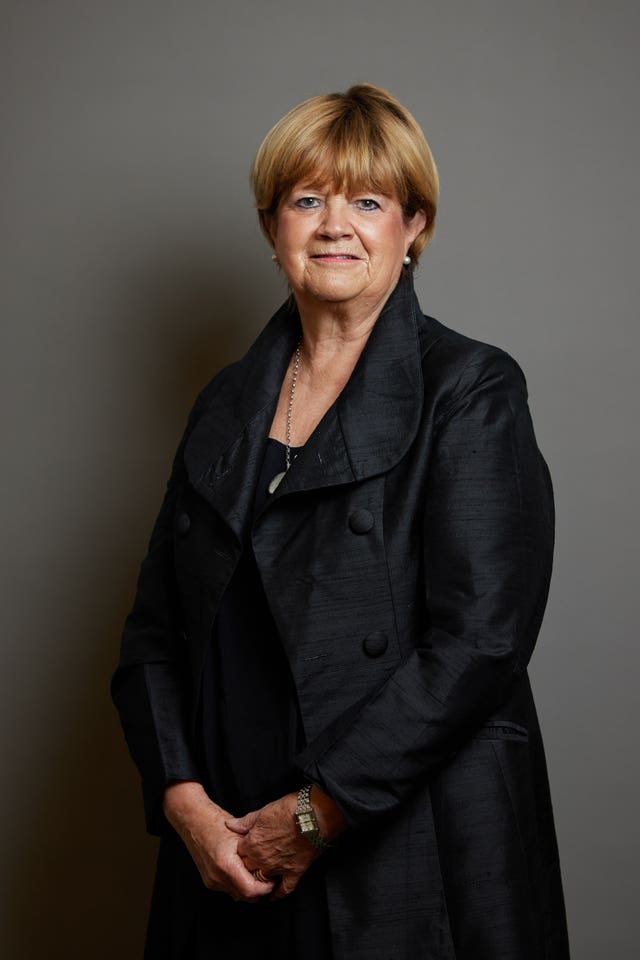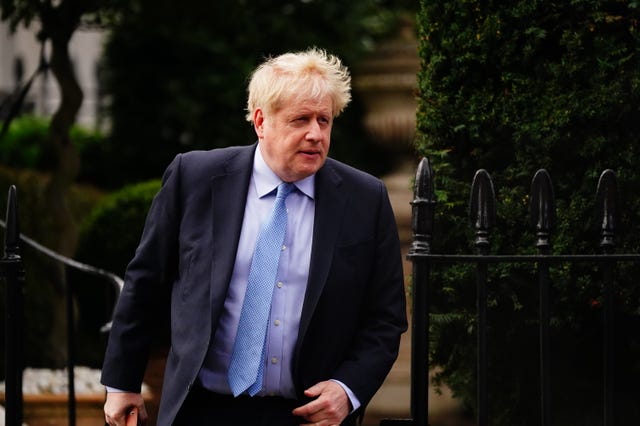Ministers are preparing for a high-profile legal battle with the Covid-19 inquiry as the Government seeks to challenge the request for Boris Johnson’s unredacted WhatsApp messages and notebooks.
Bereaved families and opposition parties hit out at the Government after the Cabinet Office took the highly unusual step of seeking a judicial review of inquiry chairwoman Baroness Hallett’s order to release the documents, arguing that it should not have to hand over material which is “unambiguously irrelevant”.
It comes as Mr Johnson, in his own letter to the inquiry on Thursday evening, said he was he was “more than happy” to hand over the requested material directly.
The step to launch legal proceedings came after days of public wrangling between ministers and the inquiry, as the Government faced a 4pm deadline on Thursday to hand over the material.
But in a letter to the inquiry, released after the deadline had passed, the Cabinet Office said it was bringing the judicial review challenge “with regret” and promised to “continue to co-operate fully with the inquiry before, during and after the jurisdictional issue in question is determined by the courts”.
That question will centre on whether Lady Hallett’s probe has the power to force ministers to release documents and messages which the Cabinet Office believes are “unambiguously irrelevant” and cover matters “unconnected to the Government’s handling of Covid”.

Baroness Hallett (UK Parliament)
Mr Johnson wrote to Lady Hallett to say that he could see “no reason why the inquiry should not be able to satisfy itself about the contents of my own Whatsapps (sic) and notebooks”.
But it also emerged, in a tranche of documents released as part of the legal proceedings, that WhatsApp messages passed by Mr Johnson to the Cabinet Office are only from May 2021 onwards.
Mr Johnson was forced to change his mobile in 2021 after it emerged his number had been publicly available online for 15 years.
A spokesman for the former prime minister said that Mr Johnson has “absolutely no objection whatsoever to providing content on the phone to the inquiry”.
“He has written to the Cabinet Office asking whether security and technical support can be given so that content can be retrieved without compromising security.
“The Cabinet Office have long been aware of the status of the phone.”
The bundle of legal documents released also included a list of 150 questions sent to Mr Johnson by the inquiry in early February, including: “In or around autumn 2020, did you state that you would rather ‘let the bodies pile high’ than order another lockdown, or words to that effect? If so, please set out the circumstances in which you made these comments.”
He was also asked: “Between January and July 2020 did you receive advice from the then Cabinet Secretary that the Secretary of State for Health and Social Care, Matt Hancock MP, should be removed from his position? If so, why?”
The clash between Rishi Sunak’s Government and the inquiry prompted accusations of a “cover-up”, as one minister conceded that the Government was unlikely to win the court fight.
Science minister George Freeman, during an appearance on BBC Question Time, predicted that the legal challenge would likely fail but argued that it was a “point worth testing”.

Boris Johnson said he is ‘more than happy’ to hand over his unredacted WhatsApp messages and notebooks directly to the Covid inquiry (Victoria Jones/PA)
Labour’s deputy leader Angela Rayner said: “While the rest of the country is focused on the cost-of-living crisis, Rishi Sunak is hopelessly distracted with legal ploys to obstruct the Covid inquiry in a desperate attempt to withhold evidence.
“After 13 years of Tory scandal, these latest smoke-and-mirror tactics serve only to undermine the Covid inquiry. The public deserve answers, not another cover-up.”
Liberal Democrats deputy leader Daisy Cooper accused ministers of a “cowardly attempt to obstruct a vital public inquiry” and said it was a “kick in the teeth for bereaved families”.
Elkan Abrahamson, head of major inquests and inquiries at Broudie Jackson Canter – who represents the Covid-19 Bereaved Families for Justice group, accused the Cabinet Office of “showing utter disregard for the inquiry”.
Lord Saville, who conducted the inquiry into Bloody Sunday, suggested he might consider quitting if he was in Baroness Hallett’s position.
“If I was prevented from conducting a full and proper inquiry, I might seriously consider resigning on the grounds that I was unable to do a proper job”, he told Channel 4 News.
A spokesman for the Covid-19 inquiry said: “At 4pm today the chair of the UK Covid-19 public inquiry was served a copy of a claim form by the Cabinet Office seeking to commence judicial review proceedings against the chair’s ruling of May 22 2023.
“Further information will be provided at the module two preliminary hearing at 10.30am on June 6.”
The Covid inquiry has sent Boris Johnson a list of 150 questions and requests for his witness statement, documents released by the Cabinet Office have shown.
Here are some of the key questions for the former prime minister:
– Did the UK Government/Cabinet Office structures and processes for dealing with emergencies at prime minister, Cabinet, Cabinet Office, ministerial and departmental levels work effectively and properly enable key decisions in relation to the response to Covid-19 to be taken?
– To what extent were key decisions made outside formal government processes, for example in informal and non-minuted meetings?
– Was the advice that you received from the Government Chief Scientific Adviser (GCSA) and Chief Medical Officer (CMO) transparent and clear throughout the pandemic? Were the roles of the GCSA and CMO effective in harnessing and distilling advice from Sage to you and other core decision-makers? Did you feel able to properly challenge their advice?
– Did you have any concerns regarding the adequacy or sufficiency of scientific and other expert advice (including where relevant, any underpinning data) on which decisions were based? If so, what were these concerns?
– Between January and July 2020 did you receive advice from the then Cabinet Secretary that the Secretary of State for Health and Social Care, Matt Hancock MP, should be removed from his position? If so, why?
– What steps did you take in January 2020 to ascertain the state of the UK’s emergency preparedness to deal with a pandemic?
– Notwithstanding that the DHSC was the lead government department, why did you not attend any Cobra meetings in relation to Covid-19 prior to March 2 2020, given the seriousness of the emergency?
– Why did you attend a personal/social meeting on the evening of March 19, after you had called on the UK on March 16 to stop all non-essential contact with others?
– When did you become aware that Covid-19 could be spread person to person asymptomatically?
– Please explain the concept of “herd immunity” and the extent to which seeking herd immunity formed part of the Government’s strategy for preventing a second wave following the lifting of social restrictions. To what extent did the Government consider that it would be possible to shield the vulnerable from severe infection as part of such a strategy?
– Please confirm whether in March 2020 (or around that period), you suggested to senior civil servants and advisers that you be injected with Covid-19 on television to demonstrate to the public that it did not pose a threat? Please provide details of when any such conversation took place and the circumstances in which it was had?
– Did the then Cabinet Secretary, Lord Sedwill, on March 12 2020 (or around that period), advise you to inform the public to hold “chickenpox parties” in order to spread infections of Covid-19? What was your response to any such advice?
– What was your understanding as to whether individuals being discharged from hospital into care homes would first be tested for Covid-19? Did the Secretary of State for Health and Social Care provide you with an assurance, at any stage, that this testing would be in place for such individuals prior to discharge?
– Please explain when and why a national lockdown was adopted in March 2020 as the UK Government’s strategy for responding to the pandemic.
– What discussions did you have with the then Chancellor, about the Eat Out to Help Out scheme prior to its implementation in August 2020? Did you support the introduction of the Eat Out to Help Out scheme at the time? Did you consider at the time, the potential impact of the scheme on the number of Covid-19 infections?
– Did you say on or around September 22 2020 that you felt that Sage had “manipulated” you into imposing the first lockdown?
– In or around autumn 2020, did you state that you would rather “let the bodies pile high” than order another lockdown, or words to that effect? If so, please set out the circumstances in which you made these comments.
– To what extent was there a four-nation approach to the Covid-19 response? Please comment on the effectiveness of intergovernmental working and decision-making between the UK Government, Scottish Government, Welsh Government and the Northern Ireland Executive during the pandemic.
– Please explain what impact, if any, you consider alleged breaches of social restriction and lockdown rules by ministers, officials and advisers, and the associated public debate at that time, had on public confidence and the maintenance of observance of those rules by the public?







